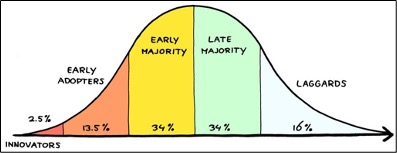Ian Wolf, Ed.D., CSAEd
Assistant Dean for Student Engagement
Passaic County Community College
Higher education is an old and rigid institution that has only changed incrementally throughout its storied history. However, the Student Affairs Educator Certification provides a fresh, new, and innovative way for higher education professionals to be the best employees they can be and be a change agent for a vital part of higher education.
Drawing on sociologist Everett Rogers’ Diffusion of Innovations theory (1962), I consider myself to be an innovator. I was eager to be a part of the pilot program for the Student Affairs Educator Certification in November 2022. I was one of the few who initially took a chance on an unproven commodity. Since obtaining my certification I have helped to spread the word about its purpose and benefits. This has led to more certificants who I would call early adopters.

My Why
I work at Passaic County Community College serving as the Assistant Dean for Student Engagement overseeing our student activities and athletics programs. I am a quintessential mid-level community college student affairs professional with a Doctor of Education.
While I am a mid-level professional, I do not believe that I am someone who would traditionally be thought of as someone who would be in the pilot program for the Student Affairs Educator Certification. I believe that the certification wasn’t necessarily geared toward someone with my professional and educational identity.
As a community college professional, professional development funding is often hard to come by requiring employees to have to think outside the box in terms of staying current with key trends in the sector. Additionally, as a student affairs professional who holds a doctoral degree, one might wonder why I sought out the Student Affairs Educator Certification. Especially after working so hard to obtain a terminal degree. Terminal typically is synonymous with end or finality.
However, I decided to pursue the Student Affairs Educator Certification for both individual and collective reasons.
On the individual level, I always strive to be the best version of myself. For me, this shows up as a steadfast commitment to professional development. We all know that professional development can take various forms based on time, place, and location. One can attend/present at regional or national conferences, read scholarly literature or timely sector-specific newsletters, be an active member of an affinity group, and more.
The Student Affairs Educator Certification represented a new form of continuous professional development for me. Yes, there was an upfront cost that, to many, may be cost-restrictive or cost-prohibitive. However, I would encourage anyone struggling to finance this certification to reach out to their Student Affairs leadership with their own compelling reason to use College funds for this certification. Or reach out to one of the founding partner associations regarding one of the many scholarship and access grant opportunities. What’s the harm in doing either? Leave no rock unturned.
Lifelong Learning & Continuing Education
Additionally, I am a lifelong learner. After obtaining my certification, I received a summary of the areas in which I was more competent in and the skillsets that I could improve upon to be a better professional. This summary document has tangibly helped me in direct ways with senior leadership at my institution. For example, the certification identified one of my areas of improvement as financial management. After reviewing my certification results summary with my supervisor, I was afforded the opportunity to work with the Vice President of Finance and Administration at my institution to examine the student activity fee and how it directly impacts community college students. This opportunity allowed me to advocate a nominal, but meaningful fee increase that will help provide more resources directly to the student population I serve.
I fervently believe that the continuing education component of the certification is highly beneficial as it forced me to seek out opportunities for additional professional development that I might otherwise not have been exposed to. This is one of the areas of the certification that I am so excited about moving forward.
Collective Support of Community Colleges & Student Affairs
On the collective level, being a part of the pilot group of the Student Affairs Educator Certification has allowed the community college sector to have a distinct voice in the iterative process of fully developing the certification. In January 2024, I attended a virtual community college certificants-specific focus group where I was able to share my viewpoint on a variety of thoughtful questions about how the certification could cater more toward the community college student affairs population. I believe that my innovative voice helped to pave the way for future community college certificants.
Last, it is my belief that as a collective, the student affairs profession has struggled to find a streamlined and accessible way to ensure that its workforce has a specific and established set of standards. The Student Affairs Educator Certification goes a long way to solve this dilemma. The certification does not and is not intended to replace an academic degree (whether it be at the master’s or doctoral level), and it certainly cannot replace hands-on practical experience. Yet, the certification does offer student affairs professionals a straightforward, clear, and industry-vetted way of highlighting their learning, competencies, and knowledge.
References
Rogers, E. M. (1962). Diffusion of innovations. New York, Free Press.